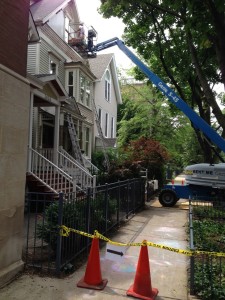An important part of our work as house painters involves the paint restoration on century-old buildings in Chicago. Some are wood-frame houses like the one in this picture. Others have elaborate metal cornices and bay windows. Ensuring safe access for the preparation and painting of the surfaces is of foremost importance.
The house in this picture is located in one of Chicago’s many old neighborhoods. It is about one hundred twenty years old and presented a number of challenges from an access point of view. Two of the obstacles were the front porch/steps and the other was the roof of the bay window. We accessed that a forty-foot ladder could reach some of the gable surfaces, but not all. So we had to look into using a boom.
At first, we thought that a sixty-foot boom could access the highest areas from being parked in the street. However, because of the proximity of two trees, we determined that a shorter forty-foot boom should be used, so it could clear the tree branches. The trees also made it necessary to park the shorter boom on the sidewalk and close the sidewalk to pedestrian traffic. Since the boom had to jump the curb, we set up a temporary driveway with 2×8 and 2×4 lumber. Three sheets of ¾” inch plywood were used to protect the sidewalk and parkway.
Once those factors have been assessed and decisions have been made about equipment and procedures, an equally important aspect has to do with securing Chicago permits to have access to the public ways. In this case, we needed three permits: fifty feet of curb space to move and park the boom, sidewalk closure and barricade for pedestrians and temporary driveway for the boom. We also resorted to the services of an expeditor to facilitate the process. In all, the cost of the rental, permits and expeditor fee was about $2,000 for three days of use.
Safety is paramount on projects like this. Our employees have gone through training to be certified as boom operators. We take our preservation work on Chicago’s old structures very seriously.








 Follow
Follow
